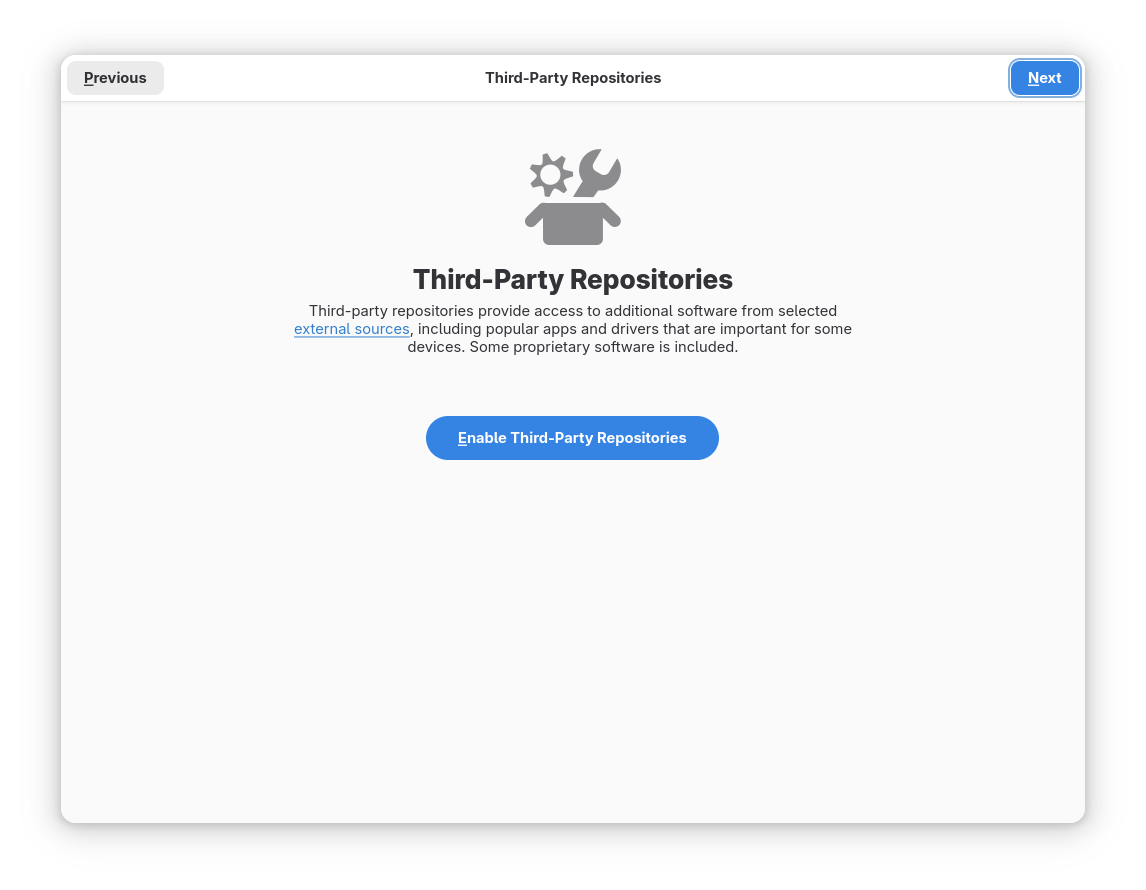- cross-posted to:
- linux@programming.dev
- cross-posted to:
- linux@programming.dev
didn’t read the article, but i never got the point of having a distro-specific flathub repo. isn’t being distro-agnostic the main thing about flatpaks?
It’s about making sure you know what is inside the flatpaks. If you make your own set of flatpaks, you can distribute them with the OS. It’s not that fedora flatpaks aren’t distro-agnostic, you can use them on any distro. They just want a set where they can verify the build process and trust.
then why not just use regular packages?
I think, because of Fedoras atomic desktops. I didn’t use any of them yet, but it seems like Flatpaks should be used there, since one should (or can?) not install tradional packages there. Therefore Fedora provides the flatpaks anyway and they can be used on the non atomic desktops as well.
Another reason is, that you might not be able to install the latest version of an application as rpm package if a required dependency in the repo is outdated. A Flatpak usually does not have the issue since a newer version would include the fitting runtime. This said, I do think its not this big of an issue for fedora which is usually quite up to date. But if you run a distribution with LTS releases or something like Debian you will much more likely have older dependencies in your repositiry.
atomic desktops
i guess it makes sense in that case, but i’m really not convinced flatpaks should be used as the default (or only, apparently) way to install every application in the system. flatpak’s flexibility is great for the particular cases where you want to install newer versions of applications or if an application isn’t available in the official repos somehow. besides that, just use distro packages
Another reason is, that you might not be able to install the latest version of an application as rpm package if a required dependency in the repo is outdated
doesn’t flathub solve that already?
Indeed. I believe most users will just switch to flathub. Sort of how most users will install some codecs, but it can’t legally be included in the base install.
This comment should be deleted soon
sounds weird to me. aren’t we replicating the repository problem if each distro decides to make a flatpak repo according to their own philosophies?
deleted by creator
i don’t have an issue with multiple flatpak repos. i’d actually find it very interesting if we went a more decentralized route with flatpak (maybe kde, gnome, mozzila would each have their own repos). but i don’t see the point of a distro-specific flatpak when we already have normal packages. compatibility is kind of a non-issue, since you’re not supposed to install them elsewhere anyway (unlike flatpaks)
also, i see absolutely no reason to use fedora’s flatpak repo on debian given that flathub exists already. you could add it if you want it, but what’s the point?
deleted by creator
that makes a little more sense, though debian is not as strict as fedora about propietary software (it is in the separate
nonfreesection, but that’s it)deleted by creator
Yes, we are. It’s exactly why it shouldn’t be done and why Fedora is the only project wasting their time with this.
That “article” is painful to try and read, it’s like a run on thought that bounces all over the place. The author really should make a clear outline and could probably cut out half by not saying the same thing over and over and over again. I stopped after the third time I read about Fedora flatpaks are different from flathub flatpaks, and users like flathub more, but the author is apparently eventually going to explain why that’s an issue after 2K words of nonsense.
It’s great they’re having this discussion, but some of the arguments seem overblown and imply Flathub does less reviewing of app than actually does.
Outdated runtimes aren’t great either, but as they learned with OBS, just updating to the newest version broke a bunch of stuff.
See this blog post for a response that was made to similar criticisms during the OBS issue. Flathub Safety: A Layered Approach from Source to User
We can flag old runtimes as out of date. Individual users or whole distros can set preferences to anvoid out of date runtimes. But Flathab must support out of date runtimes.
If an app has not been updated, I want it to continue running.
I want FlatHub to support binary only apps (like commercial ones) as well.
FlatHub is supposed to be the easy, one-stop place to publish apps. If I cannot put my app there, it is a problem.
It is supposed to be the place I get apps that will run on my distro. If the app I use daily that has not been updated in 10 years stops working, I am annoyed.
Fedora wants to deprecate runtimes that would still be “stable” on Debian.
deleted by creator
What they did was bad but I am glad the Flatpak kept working.
Uhm, isn’t bazzite practically what the author is asking for?
deleted by creator
Bazzite ships Flathub unfiltered.
Last update (which replaced Discover with Bazaar) changed that.
so no taking a precompiled binary and shipping that.
All FLOSS apps on Flathub are built on trusted platforms by default, in the open and verifiable. Same thing with Brew.
Not including proprietary software in the default config is a valid choice every distro has to make.
The sudden success of Bazzite comes from how easy it is to use.
deleted by creator
No it’s still unfiltered, we just removed 3 footguns that are pre-installed in the image anyway.
I wish they didn’t need to replace Discover and were able to integrate changes into it upstream instead of implementing Bazaar. I’m sure they had their reasons though.
That’s certainly part of the motivation (see the 4th paragraph).
Yes, image based. No, not Bazzite specifically, but silverblue (and kinoite) under the fedora banner directly.
But that’s not really the point of the article. In order for those to go mainstream, flatpak and especially flathub have a lot of maturing to do first, and the author lays out a pretty good roadmap with thorough explanations.
They’re already mainstream, any belief otherwise is ridiculous to the point of being parody.
Meanwhile you have Fedora getting legal threats because they’re shipping broken software in their own flatpak repo that exists only to waste developer time and project resources at the expense of its users and their experience.
This comment should be deleted soon
If they behave anything like what Fedora did, yes.
OBS chose Flathub as their official default supported option for their software. Fedora took that software, modified it to update dependencies they weren’t ready to use yet, and then put it on their store in a completely broken state with all of OBS’s trademarks intact and in a way that made it preferred over the official one, and then fought OBS over removing it for months while it racked up support requests from unsuspecting users (victims of Fedora’s shitty policies).
I’d love to think so too, but I think our echo chamber is pretty tight.
I certainly think they’re ready for mainstream usage (I have one Bazzite install myself), but I don’t think there’s significant awareness beyond the dedicated fan base.
There aren’t really any actually useful metrics that I know of, but the only one of the 3 I’ve mentioned that broke into distrowatch’s top 100 is Bazzite, and that’s only in the last few months.
And for legal threats: I doubt any court in any country will give credence to that. Fedora is MIT licensed.
The legal threats were credible and resulted in yet more wasted developer time removing that package instead of the entire useless repo.
You’re forgetting that millions of Steam Deck consoles have been sold and all of them are flathub exclusive.
On top of that you have: Mint, Vanilla OS, Endless OS, OpenMandriva, PopOS!, Clear Linux, PureOS, ZorinOS, KDE Neon, GNOME OS, Salix, and many others all shipping flathub by default.
Fedora is in a very exclusive group of distros dumb enough to ship their own flatpak repo.
Bringing up Distrowatch stats and “Echo chamber” in the same comment is the most absurd thing I’ve seen this year.
I think he was referring to immutable distros not being mainstream, not flatpaks.
That’s irrelevant to this conversation
What? He said “in order to go mainstream”, referring to immutable distros like bazzite.
That’s kind of what the ublue project is doing. Bazzite is a part of that, of course. But it also has more “normal” versions like Bluefin (gnome) and Aurora (plasma).
Bazzite is popular precisely because we ignore bad opinions such as these. Flathub is mainstream and all the whinging in the world isn’t going to change that.
Why only Fedora?
Fedora maintains its own Flatpak repo that competes with Flathub. This is about merging them.








